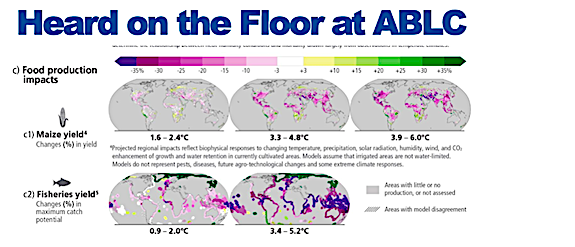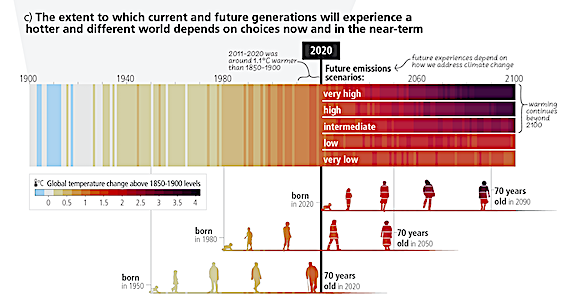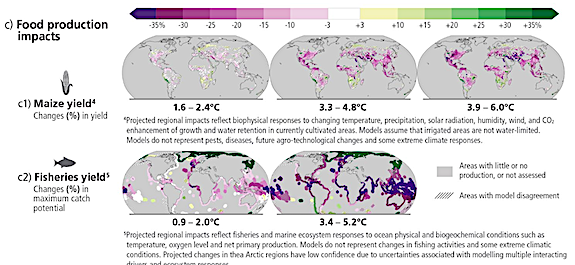Heard on the Floor at ABLC

“We’re out of time”.
Everyone’s heard the phrase, perhaps most recently in the third act of the motion picture Passengers. But I hadn’t heard it from Charlie Wyman, the legendary NREL researchers, AAAS Fellow, co-founder of Mascoma, and one of the fathers of consolidated bioprocessing, until ABLC.
The subject was deployment vs development, whether we should go with what we have as opposed to waiting for better technology to come along.
The context was the new report out from IPCC, the 2023 update on climate science. You can read it here, I suggest wearing a diaper while doing so. A couple diagrams tell the tale; I was focused not on the rising sea levels but the falling crop productivity.

Here’s how one expert at ABLC described the report to me: “1.5 degrees is gone, 2 degrees is gone, 2.5 degrees is a maybe, and at 2.5 degrees the coral dies.” The latter was not offered merely in sympathy with the lovely coral, but as a sign that the impacts could be terrible and ocean wide. I remember how Paul Giamatti as Ben Bernancke said in the film Too Big to Fail, “Credit has the ability to build a modern economy, but lack of credit has the ability to destroy it, swiftly and absolutely.” You could substitute food production for the word credit and I think it applies well.
I am not an expert on climate science, but I suspect that people who say that Earth is at risk from human-caused climate change are wrong. I suspect that planet Earth will be just fine — it is the narrow band of ecological conditions that have given rise to human dominance and survival, that’s what is at risk. Not. Earth. Rather. You, And. Me.
Most Hollywood portrayals of climate change refer to rising seas or bad storms, I suspect the real impact will be in agriculture, and soon.

Looking at the map, I estimated that in a bad-case scenario — which is what you get, more or less, from talk-about-how-no-one-wil-pay-a-green-premium and other calls to inaction — that drought will take away about half the food supply and the wars that would inevitably result from food shortages will reduce the yields eighty percent or so of what’s left. I base the first assumption on the diagram above and the second on what happened to European crop yields in the First World War.
Leaving us with enough food to feed perhaps 800 million people or so, by 2050 or 2060. Let’s presume for the sake of civil order that this surmise is not just wrong, but dead wrong. I sure hope it’s wrong, but what if it is not? It makes one think about whether Net Zero by 2050 is a viable proposition, and it might change the way we think about our plans to ease into an industrial transformation over the next 40 years or so.
The IPCC report simplifies the task
We have to worry less about 2050 because we won’t be here to enjoy it — or, better put, we won’t be here enjoying our sumptuous Western lifestyle by the time we get to see if ExxonMobil, to choose one company out of many, makes Net Zero by 2050, or not. There’s a betting chance some people will be too busy putting a fist through the last window to steal the last loaf of bread, to care whether Exxon made the goal or not.
Simplicity brings clarity
If we have until, say, 2030, to complete cease the usage of fossil fuels or face the wars that famine bring by 2050 — and famine wars are the cruelest ones — then we do not have to have an elongated debate about tax credits for EV adoption by 2035 that will flip the light-duty fleet to renewables by 2050 or so. We’re out of time for that debate, perhaps.
If not true, we should be asking “who can we trust?” rather than “what can we do?”. If it is true, as Charlie Wyman observed, we are out of time, then we can deploy, by 2030, based on what we have and where we have it, and that’s what we can do.
Simplicity brings a new mission
For years, the bioeconomy’s case has been predicated on a future in which we consume the same, or more, of our basic goods; how fast we wish that substitution to occur, that’s a political equation and has driven wind, solar and biofuels (among others) to where they are today. It’s all fiat.
Simplicity brings focus
If the IPCC report is true and stopping down use of fossil fuels in 2030 is the cure, the bioeconomy is going to be the only source of whatever goods, based on our ideas of business as usual, that we are going to be able to use. That is, no fuels, no shirts, no pants, no pesticides, no fertilizers, no containers, no chairs, no deliveries, no reliable power. Petroleum and gas are everywhere in our society — a world is which we have no herbicides? Long before we are overwhelmed by the rising waters, we’ll be choked by the weeds.
All of this depends on whether we believe in this report. Not everyone will, some will have good reasons for skepticism. But then, we might ask ourselves, if we believe some other report and not this one, if we cherry-pick amongst the scientific reports and simply celebrate those that agree with our priors, are we not drawing facts from conclusions instead of conclusions from facts? We might as well join the Kari Lake movement and stand with a charismatic candidate with a clear message and a lack of fealty to hard data.
It is possible that the report is wrong; science is a process of falsification, and maybe this report’s conclusions will be falsified by new data, new options, new tech. I sure hope so. I wouldn’t bet my life on it. But let us not simply swallow the science, even if we might follow it. As Eric McAfee observed in his Global Bioeconomy Leadership Award remarks, people thought that we we running out of SAF feedstock until pandemic pushed the price of plant oils to 70 cents per pound and all kinds of new supply emerged. At ABLC he observed that changing times brought out new solutions — and we might remember that Peak Oil was addressed by fracking, Peak Whale by electric lighting. Changing time brings fresh data — and in this context we salute the upcoming 2023 Billion Ton update tipped by DOE for later this year. At the end of the day, climate change analysis is driven by modeling, and if models made by smart people were always right, we’d never have excessive inflation or unemployment.
The problem is global, but people are local
Climate science is hard because it is complex and part of the confusion stems from the fact that most climate predictions are global when in fact most people think local. Residents of Atlanta want the weather forecast for Atlanta and not a global average if they are calculating the likely conditions for a barbecue in April.
So, we have work to do in translating global macros into the microeconomy. For, it is fair to remark that the disruptions caused by climate change, the very worst ones, will be local. Think beyond rising shores. Basic stuff like crop yields, where to put cities, where to put power lines, where to put reservoirs and pipes and roads.
When the climate shifts, rain can shift, too. Just go look at the beautiful fossils that tell the story of a wet and verdant Sahara in time gone by. When the rain shifts, there’s a change in how it gathers via a watershed into rivers that support agriculture and cities. Today’s plant-friendly rain is tomorrow’s squall across clay-filled plains that flood, swamp and provide a breeding ground for pests and no water for ports, industry, agriculture, cleaning or drinking. The doom of man is that rain moves.
At ABLC, we heard hopefully of the Biden Administration’s bold new goals for the bioeconomy, the SAF Grand Challenge, and a lot of references to the helpful provisions of the Inflation Reduction Act. We heard skepticism from airlines about Low Carbon Fuel Standards, that we should count all the carbon (and yet resist carbon tunnel vision as Topsoe’s Milica Folic warned us against). We heard from AgCertain CEO Dan Oh that we have to de-commoditize biobased ingredients, we heard that airlines have hesitation about book & claim. Plenty of intelligent discussion of urgent issues. There was a lot to hear on the floor with 842 leaders of the bioeconomy on hand.
But for those of you who suspect that the IPCC science is right, it’s time for a change in thinking. Deploy not because of mandates or incentives or hopes for a better 2100, deploy to build capacity for a planet that will be absent capacity except at the price of starvation. In a world of blind men, the one-eyed man is king, and that is what I heard on the floor at ABLC from the leaders of the bioeconomy, deploy now, deploy with what we’ve got. If we have to get off petroleum and gas faster than we think, the bioeconomy is not about building affordable substitutes for a long, long transition out of oil & gas — if we can’t make fossil plastic, fertilizer, paints, car parts and fabrics, all there will be is the bioplastic, biofertilizer, biopaint, bio car parts and biofabric. We might think about stocking up; down here in Florida, we always stock up on essentials before hurricane season, because you never know, the next one might be coming right at you.
Category: Top Stories















